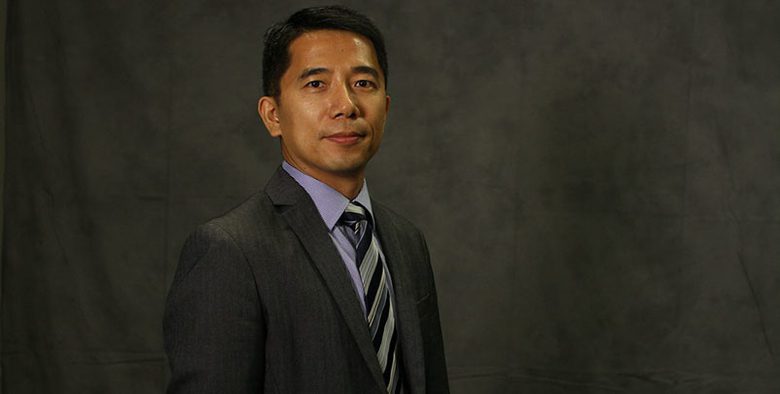Columbia Business School Professor On Keeping Your New Year’s Resolutions

Every year, half of all Americans make New Years resolutions. Unfortunately, according to the latest Marist Poll, one-third will fail. So, how do you make sure you succeed? Columbia Business School professor of business Gita Johar has advice for holding fast to your goals. Her trick: “Make it painful to break your resolution.”
How to Make Breaking a New Year’s Resolution Painful
The idea is to impose penalties on yourself for failing to keep your resolution. This can make it far more likely that you’ll follow through. By associating a negative outcome with failure, you’ll resist temptations to quit. “Self-punishment leads to heightened goal accessibility,” Johar believes.
And the idea of adding self-imposing penalties and restrictions is not new. Its origin goes back to ancient Greece and the Odyssey when Odysseus tied himself to his ship’s mast to resist the call of the Sirens. For modern times, the concept can be applied to using a smartphone app to reduce screen time or using an alcoholism drug to stop alcohol abuse.
“Enduring pain, in other words, is not just a nudge to do better in the future but also an inward sign of self-control,” Johar’s research explained. “You feel you have more self-control if you’re able to withstand pain.”
Proof Is in the Pudding
To prove her concept of using pain to succeed, Johar and her colleagues conducted a “painful” experiment that tested students’ willingness to drink bitter juice and listen to unpleasant noise.
In one experiment, 205 undergraduate students were tasked with thinking about a time they had too little self-control and overspent. They were then asked to read either an article about how negative sensory experiences were an indicator of self-control or how negative experiences had no indication of self-control. All students were then asked to drink bitter juice.
The students who read that self-control and negative experiences go together drank more bitter juice than others—they punished themselves for their failure with money. “Upon recalling a self-control failure that one feels responsible for, individuals who believe their personal qualities can change are more likely to endure negative experiences,” explained Johar.
The takeaway is that if you want to reach your 2019 New Years resolutions, you need to aim high and back up your goals with firm self-punishments when you fail. Read more about this idea on the Columbia Business School news site.
This article has been edited and republished from its original source, Clear Admit.
Energy Conservation, Healthcare Struggles, and More – New York News

Let’s explore some of the most interesting stories that have emerged from New York business schools this week.
Do as Your Neighbor Does? Neighbors Caring about the Environment Makes You More Likely to Conserve – Columbia Business School
When it comes to interpersonal decisions, group elements often become a heavy factor, including with conservation.
Columbia Business School Professor Adam Galinsky recently co-authored a new study in Nature Human Behaviour that may offer insight into how to affect meaningful changes toward climate conservation.
By focusing on “second-order normative beliefs,” the researchers illuminate that when it comes to topics like energy conservation, for instance, “what people believe their community members care about is an important predictor of individual conservation behavior, above and beyond people’s own beliefs about energy conservation.”
Galinsky explains, “The evidence shows that policymakers can’t simply ask people to reduce, reuse, and recycle. In fact, trying to reach people with subsidies for environmentally-friendly decision-making can backfire. Instead, the roadmap to improving perceptions of conservation starts with reminding individuals that their neighbors care about it. It’s important to shift the focus from trying to change what people believe to reinforcing what their friends believe.”
You can learn more about the research here.
Faculty Snapshot: Finding a Remedy for Health Care’s Struggles – Rutgers Business School News
The Rutgers Business School recently profiled Assistant Professor of Supply Chain Management and Program Director for the Masters of Science in Healthcare Services Management, Xin (David) Ding, whose research studies “potential ways to increase hospital revenues through process coordination, patient involvement, and the cultivation of a patient safety environment.”

Professor Xin (David) Ding / Photo via business.rutgers.edu
The recent profile in Rutgers Business School News reads:
“While physicians and nurses traditionally have been trained to take care of clinical needs from patients, they don’t necessarily know how to manage operations and businesses well. With the transition from volume-based care to value-based care, supply chain concepts can help care providers maximize value through the optimization of their resource allocations.”
You can read more from the profile here.
In the Future, Everyone Will Be Able to Make Robots – Stevens Institute of Technology SOB News
The Stevens Institute of Technology President’s Distinguished Lecture Series recently hosted prominent robotics and AI researcher Daniela Rus who “challenged the audience to rethink conventional notions of robots.”
“Imagine the limitless possibilities that could arise from the ability to create the machines that can help save lives, improve the quality of life, or transport us to places we cannot go to on our own,” she notes.
“Right now we have the ability to use our technologies, coupled with interesting interfaces, to enable much more extensive capabilities. And while, today, we can begin to use natural language to program machines, how far can we go in connecting us directly to the machine?”
You can learn more about Rus’ research here.
Finance Fraud Won’t Stop, and More – New York News

Let’s explore some of the most interesting stories that have emerged from New York business schools this week.
Don’t Let Artificial Intelligence Take Your Job – Rutgers Business News
The Rutgers Business School is slated to host a symposium this week entitled “Lifelong Learning in the Digital Era,” which will host LinkedIn, edX, Google, and McKinsey experts, among others, to “offer solutions to companies and individuals on how they can refresh their knowledge and skills and not become irrelevant in the new digital economy.”
Rutgers Dean Lei Lei says, “The pace of change in technology requires both management and the workforce to keep their skills current. Otherwise, they will lose out to competitors that have increased their efficiency and stimulated product innovation,” she said.
Rutgers Assistant Professor of Professional Practice and Symposium Organizer Leon Fraser adds, “Recent college graduates as well as seasoned executives must refresh their skills regularly or risk becoming irrelevant and disposable.
You can read more about the recent symposium here.
It Pays to Cook the Books–Even When You Get Caught – Columbia Business School News
According to new research from Columbia Business School’s Shiva Rajgopal and Dan Amiram, along with researcher Serene Huang, the risk of detection for cooked books is only about 25 percent, which means that “more than half of perpetrators—most often the CEOs and CFOs of major companies—could find it beneficial to commit financial reporting misconduct.”
Rajgopal writes, “Unless regulators improve their processes, research shows that financial reporting misconduct will continue to be an attractive option.”
Their study, “Does Financial Reporting Misconduct Pay Off Even When Discovered?,” finds that “stock market losses are an effective deterrent: analysis shows that the average cost of getting caught amounts to $26.7 million, with the notable hits coming via stockholding and forgone earnings, suggesting that the stock market and the labor market are generally effective at punishing perpetrators.”
You can read the complete study here and the full article from Columbia Business School News here.
Young Professionals Earn Binghamton University MBA While Pursuing Full-Time Careers in NYC – Binghamton SOM Blog
The Binghamton University School of Management blog recently highlighted its one-year Professional MBA (PMBA), which enables students to earn MBAs while simultaneously pursuing careers via Saturdays-only classes.
“The PMBA program is designed specifically for New York City-based young professionals who are looking for a step up without temporarily stepping out of their relatively new careers.”
Trevor Smith (MBA ’17) and current district sales manager for Mazda of Boston writes, “It’s so much more than being able to look at data and know what’s going on—we learned how to deliver an effective message and story based on the data.”
“I feel much more comfortable communicating with top decision-makers than before, and it prepared me to better manage both my personal and professional life.”
Laurice LuSane (MBA ’15) and Weill Cornell Medicine Fellowship Coordinator adds, “What I was learning made me feel ready for something new. I was ready for new challenges at work. I was given more opportunities to speak out, to plan, to manage and to show I was capable.”
You can visit the program page here and check out the entire Binghamton SOM Blog entry here.
Chicago Booth, Northwestern Kellogg Top Economist 2018 Rankings

The newest Economist best MBA rankings for full-time programs is officially out, with two Chicago schools topping the list.
Are Business Schools Equipped to Handle Climate Change?

The United Nations’ panel on climate change issued an alarming warning earlier this month. In order to avoid worsening events such as increasingly deadly storms and heat, the extinction of coral, and ever rising sea levels, member nations must act fast. Global leaders of business must pay particular attention to this warning, as the world economy will need to transform in order to support the vital decrease of carbon emissions.
The Perfect MBA Career: Portfolio Manager

If working in investment strategy seems appealing, then a job as a portfolio manager may be right for you.

